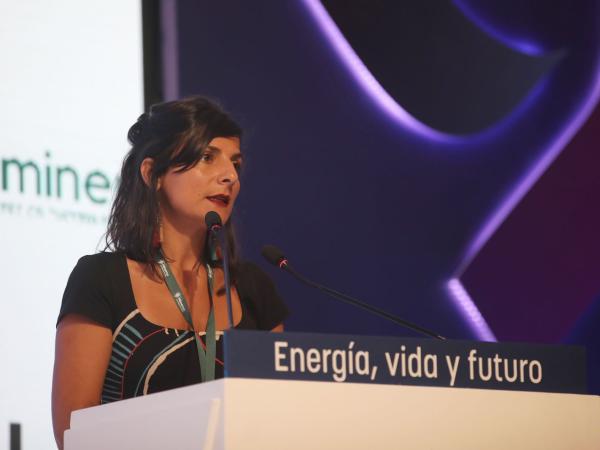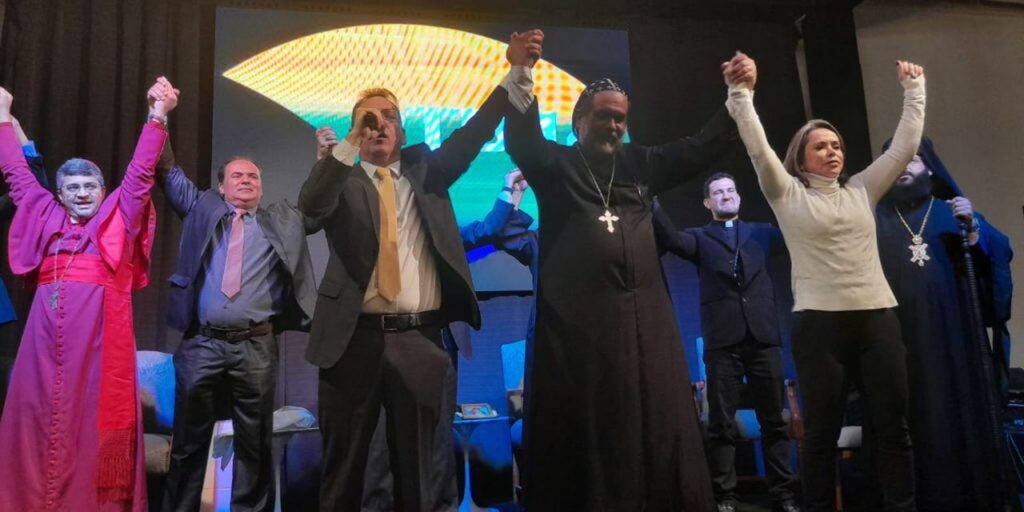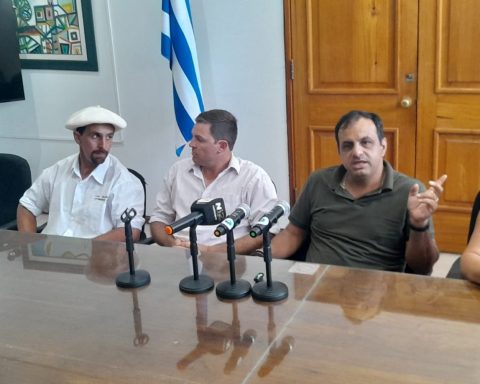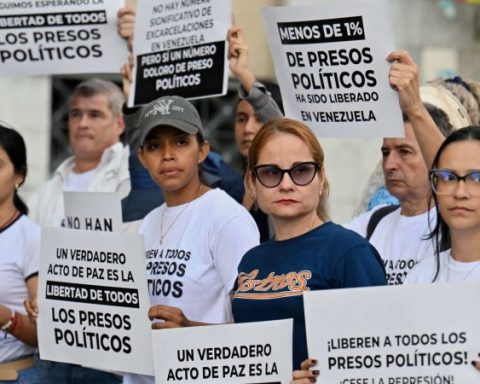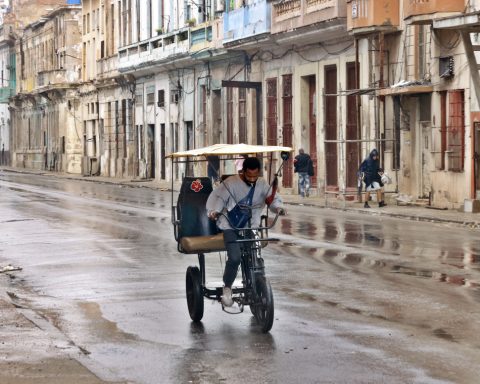“I think this cabinet meets the objective, a second time for the Government,” said Izkia Siches, former Minister of the Interior and Public Security, with a broken voice, when at 4:00 p.m. this Tuesday she walked out the doors of the Democracy and Memory Hall to cross the Patio de los Cañones and leave the Palacio de La Moneda.
The cabinet change ceremony on September 6 at the Government headquarters marked the beginning of a new cycle of an administration that had to quickly reorganize its forces and draw a new strategic path, this after the devastating defeat of the Approval in the plebiscite this Sunday.
This materialized with the departure of his close collaborators and pillars of the campaign that led Gabriel Boric to become President of the Republic: Izkia Siches, who left the cabinet, and Giorgio Jackson, who left his post as Minister of the General Secretariat. Government (Segpres), to be relocated as head of Social Development (after the departure of Jeanette Vega). The President turned to Carolina Tohá (PPD) for Interior and Ana Lya Uriarte (PS) for Segpres, two figures linked to the former Concertación.
In this way, the political committee is now made up, in addition to Tohá (PPD) and Uriarte (PS), by the spokesperson minister Camila Vallejo (PC); the Minister of Finance, Mario Marcel (close to the PS); and the Minister for Women, Antonia Orellana (Social Convergence). The Minister of Labor, Jeannette Jara, joins this group, after the President announced her inclusion in this space, because -according to the President- she has “clearly demonstrated the ability to reach great agreements, agreements sometimes improbable, which is what the country needs at this time”, in reference to the agreements regarding the project to reduce the working day to 40 hours.
Although such an argument implies recognition, the incorporation of Jara is read as a gesture towards the PC, but essentially it entails an attempt to compensate Approve Dignidad, which is weakened by the strengthening of Democratic Socialism. In this way, at least numerical balances are achieved: three members of Democratic Socialism (Tohá, Uriarte and Marcel) and three of I Approve Dignity (Vallejo, Orellana and Jara).
But the numbers are not everything, because the political and economic leadership of this second period undeniably falls on Democratic Socialism, which, beyond the new names, is none other than the old hosts of the former Concertación, with whom the right has more dialogue experience.
A restructuring promoted to face a scenario of enormous complexity, and President Boric understands it that way. In the middle of his speech this Tuesday, he pointed out that “tIt had to hurt. And it hurts, but it is necessary. It is perhaps, I think I have no reason to hide it, one of the most politically difficult moments that I have had to face. In addition, the head of state added that “we need a new coordination of the Government, where I also want us to jointly strengthen the coalition that supports us and above all confront, with those who remain, citizen emergencies. With some of you, even before we have had differences, however, the greater good of Chile requires us to meet”.
In this sense, analysts agree in establishing links between the current political moment and the crisis suffered in the second government of former President Sebastián Piñera, from the social outbreak. The difference, not least, is that said collapse in the leadership of the country that emerged in October 2019 was in the twilight of the Piñera administration, while this problem shakes President Boric as soon as his term began, with five months in office, and a long period ahead.
Now, the discussion for a new Constitution is transferred to Congress, and from the opposition they summoned the President to focus on the tasks of leading the State, understanding that from now on the parliamentarians will be in charge of conducting the conversations on the fate of the process. constituent. This was expressed by the senator and president of the UDI, Javier Macaya, who after the meeting he held this Tuesday with the Head of State, said that “today what corresponds is that Congress dedicates itself to seeing what the borders will be of the constituent itinerary, and the President must pay full attention to administrative work, because for five months the Government has been attending to the constitutional debate and has ignored very important tasks related to the economic agenda, the cost of living, terrorism in La Araucanía, delinquency and organized crime, among other matters”.
In this sense, the sociologist and academic of the Faculty of Social Sciences of the University of Chile, Octavio Avendaño, believes that “definitively, this is not going to be a government of transformations, because the conditions are not given for it to be At best, it will be a transition government towards a new stage of advancing in a commitment that is expected by a good part of the citizenry, which is constitutional change. So, with this turn, perhaps a formula will be facilitated much more effective, that arouses much more consensus than the formula that was established to define the text of the new Constitution recently voted on”.
The tangled arrival of Ana Lya Uriarte (PS) to Segpres
At noon this Tuesday the media were summoned for the cabinet change. Minutes before, the press was informed of the resignation of Manuel Monsalve (PS) from the Undersecretary of the Interior –who was supposed to occupy the position of Segpres– and the appointment of Nicolás Cataldo from the Communist Party (who left the Undersecretary of Education) .
A tweet from 2011 in which Cataldo referred to police officers as “torturers” quickly began to spread through social networks. Message that some actors of the center-left and the right immediately criticized, understanding that coordination is carried out in said undersecretary’s office so that the police set their criteria in terms of security.
At 13:24 Monsalve left to preside over the ceremony and it was there when it was learned that his resignation was not effective. Later, close to the Presidency they assured that it was decided to leave Cataldo in his position because of criticism from the opposition, and when asked what the original design for Monsalve was, they replied that “that cannot be counted.”
Finally, Ana Lya Uriarte (PS), who arrived at the Ministry of the Interior months ago as chief of staff of Izkia Siches, was appointed head of the Segpres. In agreement To sources close to the president of the Socialist Party, Paulina Vodanovic, it was she herself who recommended the name of Uriarte to President Boric. And from his community they highlight his political experience facing complex moments, such as when –in her role as chief of staff He had to accompany former President Michelle Bachelet in the carnage due to the implications of the Caval Case. Nearby describe her as a politician “with a doll, with a trade” and that in her recent work with Siches she had optimal approaches with parliamentarians from different benches.
His arrival at Segpres was notorious from the beginning. “Ana Lya Uriarte made the right wing come in half an hour,” said a helmsman from the ruling party when leaving the meeting that President Boric called on Tuesday – where he invited all the presidents of parties with parliamentary representation – to agree on the course that the constitutional process would continue in Congress.
In the afternoon, Renovación Nacional had announced, through its president, Francisco Chahuán, that they would not go to the appointment, annoyed by the mess of the appointment of Nicolás Cataldo and accused the Government of improvisation. However, according to the helmsman later, he called Uriarte to raise the possibility of a private meeting between the President and the parties of Chile Vamos, after the open conversation with all the representatives.
“Thanks to the call to Ana Lya Uriarte we are in La Moneda. I have known her for many years, since the first government of Michelle Bachelet. She is a woman with whom I have shared a lot, we have confidence. This will unlock the issues, there will be an open dialogue. Her relationship with Jackson was a formal one, this is one of years, of trust, of understanding that the refoundational looks are no longer there. I proposed to the President that if we continue with maximalist and refoundational views we are going to end up entrenched”, assured Chahuán when leaving the last meeting.
Carolina Tohá to Interior: the search for experience
Members of the Broad Front explained that the exchange of Izkia Siches for Carolina Tohá, with whom the President recognized –last August in an interview with Chilevisión– having conversations, responded to the “reflection that both the Government and the political committee needed better leadership”. From Democratic Socialism they considered his arrival as a relevant milestone, “because he is a person with experience, necessary above all for this political generation that governs for the first time.”
From the same sector they assured that a more balanced cabinet between the two government coalitions, I Approve Dignity (FA, PC, FRVS) and Democratic Socialism (PS, PPD, PL and PR) is positive. They described it as necessary after the results of the exit plebiscite, which “changed the correlations of power in the country,” according to the ruling party.
In this sense, the political analyst Mauricio Morales considers that “the President transfers power from Approve Dignity to Democratic Socialism. The mere fact of appointing Tohá in the Interior is proof of that. The PS/PPD increases its weight quantitatively and qualitatively within the cabinet, showing that the President is more inclined to moderation and gradualness than to speed and refoundation.The Government will only begin to govern from now on, after being trapped in a plebiscite logic that was profoundly damaging to his management. The original failed. He did it two months after taking office, but the President decided to make the change almost 6 months after taking office. A little late, but it is a change that goes in the right direction.”
Although Tohá’s arrival in La Moneda had certain critical voices, in relation to the pending trial of accounts with the Comptroller’s Office, due to possible inappropriate expenses in her management as mayor of Santiago, the need to add political experience and balance the forces prevailed. between both coalitions. After the forced resignation of Jeanette Vega from the Ministry of Social Development – publicly prosecuted for the leak of a conversation between one of her advisers and the leader of the Arauco-Malleco Coordinator (CAM), Héctor Llaitul -, the president of the PPD, Natalia Piergentili expressed his intention that a member of his party join the Government’s political committee. A request that was answered by the President, and with a vengeance, because Tohá not only comes to said committee as one more member, but also assumes the role of leading her, one of the outstanding debts of her predecessor. , Izkia Siches.
In the middle of her first speech as the new Minister of the Interior and Public Security, she remembered José Tohá, her father and former Minister of the Interior in the Government of Salvador Allende. Likewise, she assured that “changing names does not have a magical effect. We must move our ability to reach agreements with all sectors.” In this way, the incoming Secretary of State assumes the second most important leadership in the structure of the Executive, behind the President, assuming that the main challenge of her management will be to contribute to the political articulation, in this new stage that began with the defeat of Approval, last Sunday, September 4.












